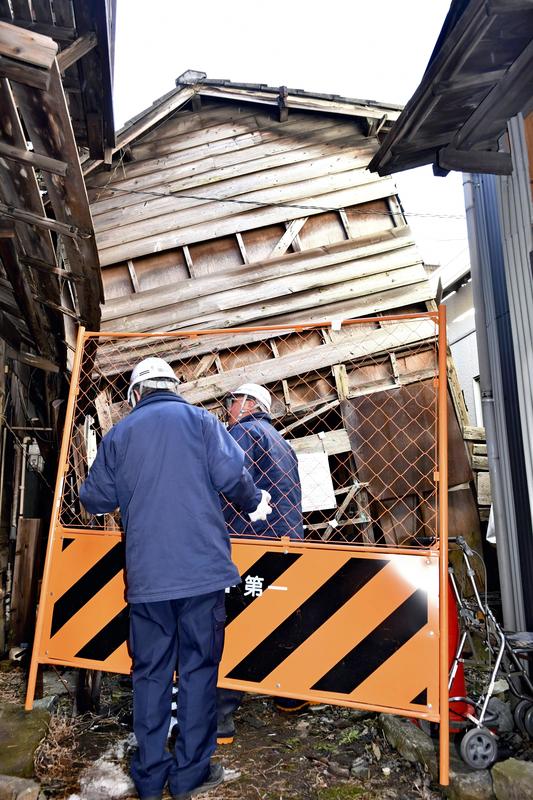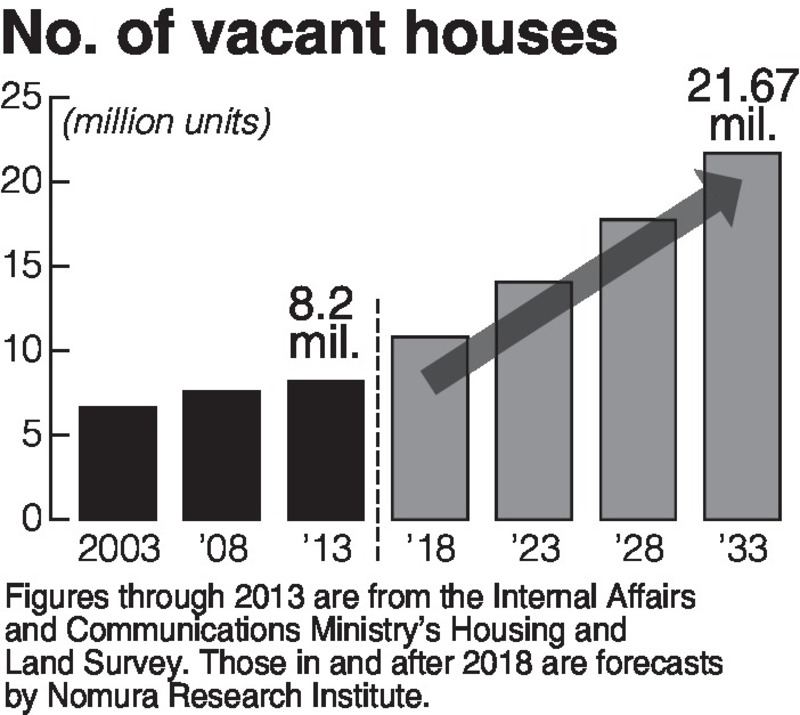
The number of vacant houses is growing across the nation, and both the public and private sectors are heightening their efforts to deal with various problems stemming from the situation.
Some private companies have begun full-fledged business activities aimed at better utilizing vacant houses. In April, the Land, Infrastructure, Transport and Tourism Ministry launched a system that certifies the quality of vacant houses so consumers can buy them with a sense of security.
Attention is being paid to whether those efforts will be able to resolve the problems related to vacant houses, which have grown increasingly serious.

'Sold' for 0 yen
Last summer, a woman in her 30s in Matsuyama posted information about a vacant house on Jimoty, a website that lists secondhand properties. Her late father-in-law had lived in the house.
She gave the house away for free. "I found a person who wanted to repair the house and live in it. That was great, because I desperately wanted to relinquish it," she said.
According to website operator Jimoty Inc., in recent years users have listed vacant houses and vacation homes in its auction corner for 0 yen because real estate companies declined their requests to broker the houses or potential buyers could not be found.
Such offers draw a lot of attention from the website's users, the company said.
In those cases, Jimoty does not charge a commission fee. If such offers attract a lot of views, it benefits the company's online advertisement business.
A number of railway companies, including Keikyu Corp., began a business in April 2017 to rent vacant houses along their train lines from the owners, repair them, and sublease the houses to people who want to live there. Their aim is to prevent scenic views along the train lines from deteriorating, and keep local communities along the lines from going into decline as a result of an increase in vacant houses.
The Daikyo group, a major group of real estate business companies, rents vacant units in condominiums in Okinawa Prefecture to people who stay in the prefecture for a month or longer.
According to the Internal Affairs and Communications Ministry, there were about 8.2 million vacant houses as of 2013 across the nation. The number has been rising steadily, partly because Japanese people have a deep-rooted tendency to prefer newly built houses. It also stems from the decreasing population and an increase in cases of property inheritance.
The number of vacant houses increased about 20 percent over the past decade.
Nomura Research Institute predicts that if vacant houses are not utilized more effectively, their number will increase to 21.67 million units in 2033, accounting for more than 30 percent of all houses in the nation.
Ward steps in
The situation is also a source of worry for administrative authorities.
The Taito Ward Office in Tokyo demolished and removed a vacant house through a summary administrative subrogation procedure in January this year, acting under a law for special measures to cope with vacant houses.
It was the first time that a vacant house in Tokyo had been demolished through the procedure.
There were fears the abandoned vacant house would collapse. "Because we were unable to identify the owner and the vacant house posed a danger to residents, we stepped in to do the demolition," an official of the ward office said.
The problems related to vacant houses are no longer matters concerning only individuals, they have become social concerns for local communities.
Therefore, the land ministry began in April a new system that certifies ads and other forms of information about secondhand houses with specialized certification marks.
These marks are given to secondhand houses on certain conditions, such as when there have been no leaks from rain or when refurbishment work has been done.
By providing information sought by people who are considering the purchase of a secondhand home, the ministry aims to encourage deals in the market.
Local governments have also strengthened their efforts to that purpose. For example, local governments have opened Akiya Bank, an online program in which information about vacant houses is available to the public and possible tenants are solicited via the internet.
Read more from The Japan News at https://japannews.yomiuri.co.jp/







